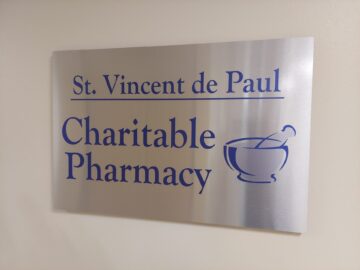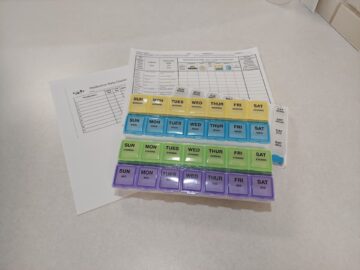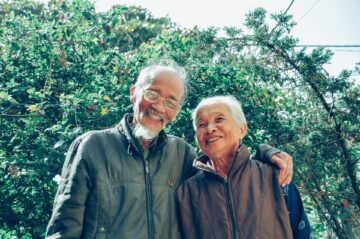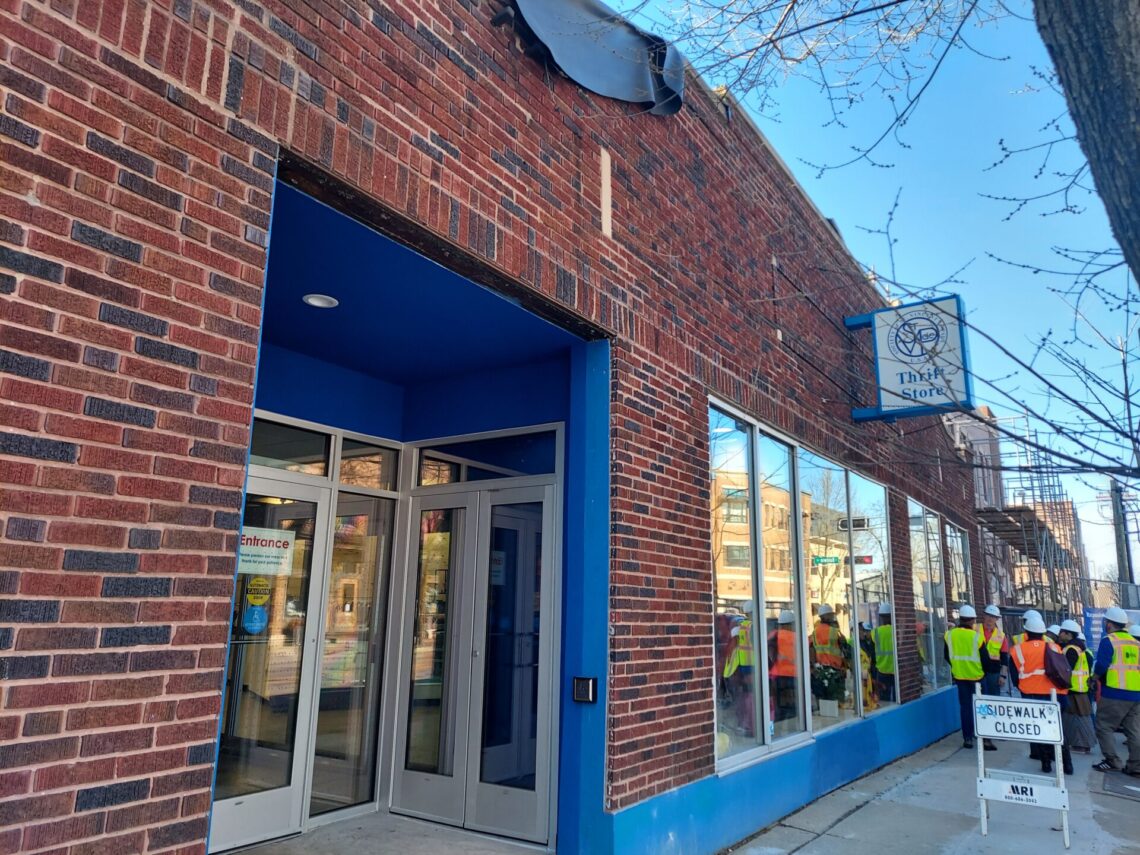A lifelong volunteer and health care professional, Kathy moved to Madison after nursing school. She spent the bulk of her working career in the NICU at St. Mary’s Hospital. She retired in 2013 and began volunteering at the St. Vincent de Paul Charitable Pharmacy.
“I knew about the stores,” Kathy said. “I first started in the food pantry and volunteered there for about six months. Then someone told me there was a pharmacy downstairs. So, I came down and stopped going upstairs,” Kathy laughed.
Above and beyond volunteer service
When she began volunteering, Kathy was the “welcome window lady.” She checked patients into the pharmacy and confirmed their prescriptions were ready for pickup. She continues this role now with the curbside process and fields questions from people about the certification process or the pharmacy in general.
Kathy always goes above and beyond her duties as a volunteer. She sees a problem and works to fix it.
For example, she regularly answers calls from people interested in donating items to the pharmacy. For medications the pharmacy can accept, she supplies the needed information for folks to do so. For medical supplies, the pharmacy cannot accept she coordinates with a friend, Mary Dowling, at Sharing Resources Worldwide to donate supplies to medical missions in Honduras.
A while ago, Kathy noticed the supply of expired donated medicines that the pharmacy couldn’t use. Kathy worked out an agreement with Officer Barret R. Erwin at the UW-Madison Police Department to safely dispose of the medications. Thanks to Officer Barret, the station accepts and disposes of the medications for free rather than having the pharmacy pay to dispose of them.
“I just had this thought; UW Police isn’t too far away,” Kathy recalls. “Since we’re a nonprofit, they’ll take the medications for free. I collect the unused medications and coordinate a time to drop them off. If there’s a simple way to take care of something that’s not terribly out of my way, I can do that.”
The best aspects of volunteering
Kathy is grateful the pharmacy accommodates her flexible schedule and that she doesn’t have to find a substitute when she is sick or on vacation. She is grateful for expanding her network, and the best aspects of volunteer have been the people and patients.
“It’s the people. The people you get to know,” Kathy said. “The patients who know your name, especially when they came to the window. They have all been very nice and generous. We laugh a lot.”
“My idea of retirement is that you work or you volunteer at a place so you can expand the group of people that you know,” Kathy continued. “ You have to keep active in retirement. Find your niche and volunteer to share your skills. Find what you want to do and find where you can be helpful.”
A heart to help people
If the pharmacy didn’t exist, it would be a daily struggle for patients with diabetes to find regular medications and more people would end up in the Emergency Room, Kathy said. The care that the pharmacy volunteers and staff provide helps lower patients’ stress.
“I think St. Vincent de Paul is a good organization that works with people who need help,” Kathy said. “Everyone involved is committed to improving the community and helping others. All of the places I volunteer help people with low incomes.”
Besides her longtime commitment to the St. Vincent de Paul Charitable Pharmacy Kathy has volunteered at Specialty Care Free Clinic in Madison since 2011. As the only free specialty clinic for uninsured patients in the state, the clinic sends numerous patients to the pharmacy for their prescriptions. She also volunteers at the Lacy Food Pantry Garden where she helps plant, grow and harvest produce for distribution at the pantry. She is an avid sewer and donates her handmade quilts to Open Doors for Refugees.
Join the volunteer team! Click here or contact Zoe Lavender, Volunteer Coordinator, at zlavender@svdpmadison.org or (608) 442-7200 x71 to help.
Have you ever been in a stressful time full of things beyond your control?
For Mr. and Mrs. Thao* that stressful time occurred when they were both admitted to the hospital. Neither had health insurance. They were worried. Worried about what was wrong with each of them and what it would mean – What would it cost? Where would they go? Who could help them?
Once diagnosed, they received treatment plans and prescriptions for multiple medications. Yet the costs for a reduced rate prescription program was financially beyond their means.
A hand outstretched to help
At a follow-up appointment, a glimmer of hope appeared. Their nurse recommended the St. Vincent de Paul Charitable Pharmacy.
The Thaos now make monthly visits to the pharmacy to pick up their prescriptions – at no cost to them. They also receive support and encouragement from pharmacy staff and volunteers.
In its ten years of operation the St. Vincent de Paul Charitable Pharmacy staff have filled over 50,000 prescriptions for more than 1,500 uninsured adult patients.
Mr. and Mrs. Thao live healthier lives because of your care and commitment to our neighbors in need. Without you, each of these individuals would suffer from untreated effects of heart disease, high blood pressure, diabetes, and mental health conditions, and be susceptible to the flu and COVID-19 variants.
The pharmacy is often the last lifeline for patients who have nowhere else to turn. Many patients are initially referred from hospitals, emergency departments, and local clinics.
The importance of good communication
Even as the couple started on a stable regime, there was one more hurdle to overcome.
Both Mr. and Mrs. Thao are native Hmong speakers with limited English. Thanks to Ricky, a St. Vincent de Paul Charitable Pharmacy volunteer fluent in the Hmong language, the couple can fully understand how to properly manage their conditions and medications.
Hmong is the third most common language spoken in Wisconsin. It’s primarily an oral language with a relatively short written history. For older Hmong adults who cannot read the language or speak English fluently, navigating life, including a detailed pharmacy visit can be difficult.
During each pharmacy visit, the couple sit down with Managing Pharmacist, Yolanda Tolson-Eveans, RPh, where she provides a pill organizer, schedule and calendar. The calendar shows images of the pills they’ll receive so they know what to expect (at right). Ricky is on hand to translate and explain her instructions.
“Ever since we’ve been here it’s been so helpful to have a schedule and calendar,” Mrs. Thao affirms. “We’re very thankful to the donors and everybody. Even as cold as it gets, the pharmacy staff is helping (outside for the curbside delivery). We’re grateful for the pharmacy and volunteers.”
Recalling their first meeting, Ricky immediately noticed Mr. Thao’s face relax when they were introduced.
“Bridging the gap of understanding and ensuring access to care is so important,” Ricky commented. “When you have someone that is of your culture and community, you have trust in the healthcare system. Trust in the pharmacists and trust in the pharmacy.”
Today, the world is a little brighter because of your dedication. Today, the Thaos and hundreds of neighbors like them can thrive.
How you can help pharmacy patients right now
In December 2022, Congress passed the Consolidated Appropriations Act, 2023. There are several health-related policies in the document. One of the most notable for the pharmacy relates to changes in Medicare coverage. During the COVID-19 Public Health Emergency, states were “prohibited from terminating or reducing benefits for most Medicaid enrollees.” During this time, Medicaid enrollment increased by nearly 30%. This “continuous coverage” will end this month, March 2023. States have three months to plan for a return to regular eligibility and enrollment but experts expect it could take up to a year for people to receive renewed coverage.
For neighbors relying on prescription medicine everyday, doing without them puts them at risk for declining health, job loss, and expensive emergency department visits. As patients are dropped from Medicaid coverage, it is anticipated that neighbors in need of free medication will drastically increase. To serve more patients, the pharmacy will expand operating hours. Additional hours will also allow UW-Madison School of Pharmacy students to provide patient care and earn valuable practical experience.
Here are three ways to help:
- Share a gift. Give a one-time gift or become a monthly Sustaining Samaritan pharmacy donor. Even with donations and discounts, the average cost of each prescription is over $90.
- Share why you care about improving healthcare access. Spread the word about the St. Vincent de Paul Charitable Pharmacy. We often hear that people don’t know about our service. The more we can get our word out, the more people we can help.
- Share your time. Do you have a free afternoon each week? There is no prior healthcare experience needed to volunteer.
Sources: Princeton University, Unwinding Provisions in the 2023 Consolidated Appropriations Act, Georgetown University Health Policy Institute, Consolidated Appropriations Act, 2023: Medicaid and CHIP Provisions Explained
*Using last names only to protect the neighbors’ privacy. Photos are representational.




